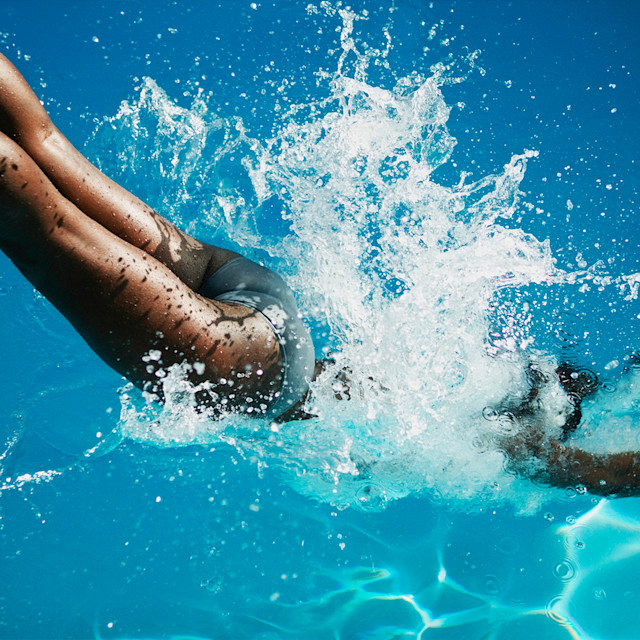How aqua workouts support strength, cardio, and recovery.
Water workouts have long been synonymous with the senior community — and it’s time to scrap that stereotype.
“Many people assume that pool classes are for the active aging (older) population, while in fact, the benefits of training in water are equal if not greater than on land,” says Kristy Discipio, Director of Group Fitness Programming at Equinox. “My mission is to shift the needle from the notion that ‘the pool is for old people’ to ‘the pool is a phenomenal place to train.’ It's for everyone.”
There’s no better evidence than Equinox’s Aqua offerings, which take water workouts seriously. They span two categories: fitness-based (non-swim classes) and skill-based (swim classes).
The former translates the group fitness experience into the pool, challenging you just as much as a boot camp or functional training class might. The fitness-based options include Aqua Sport (think: athletic drills, plyometrics, and interval training) and Aqua Strength (endurance-style with higher reps, continuous movement, and a steady heart rate), Discipio says.
RELATED: The Signature Story
On the other hand, the skill-based sessions let you get your Katie Ledecky on; join an EQX H20 or Swim Team class designed for the swim enthusiast and get ready to crank out some laps. These classes are broken into levels (beginner, intermediate, and advanced) depending on how many yards you’re game for. And a third fitness-based class is on the horizon: Equinox is currently piloting Aqua Athlete — an intense, cardio-strength hybrid water workout incorporating interval training, low-impact plyometrics, and power moves — with members at Columbus Circle in New York City.
Whatever Aqua class you drop in on, you stand to reap as many perks as your usual landlocked workouts, if not more. “Some benefits of training in water include improved cardiovascular health, reduced joint stress, and better balance and coordination,” Discipio says. Water provides natural resistance, engaging more muscle fibers during movement than on land, while the unstable environment of water challenges your balance, she says. With water in all directions, it’s the ultimate way to train every plane of motion.
My mission is to shift the needle from the notion that ‘the pool is for old people’ to ‘the pool is a phenomenal place to train.’ It's for everyone.
A recent systematic review and meta-analysis of research on aquatic exercise published in the Scandinavian Journal of Medicine & Science in Sports found that healthy adults who performed 12 weeks of water training (for about an hour, two to three times per week) meaningfully improved their strength, balance, and cardiorespiratory fitness — the last of which seems to earn an even more significant boost compared to dry-land training. For those with chronic conditions like heart disease, diabetes, and Parkinson’s, they also found that water training can improve other markers like pain and quality of life.
Moreover, water workouts are also fantastic for rehabilitation. For example, if you’ve ever been relegated to the bike with a running injury, you know how crucial it is to find gentler ways to keep moving. “Buoyancy in water significantly lessens the pressure on joints, making it beneficial for injury recovery or individuals with joint pain,” Discipio says.
Getting your heart pumping in a pool vs. on a dry gym floor can also have surprising effects on your mental health. If you’re familiar with the “blue mind theory,” a concept popularized about a decade ago by marine biologist Wallace J. Nichols, you already know that being in and around water appears to have profound soothing effects on the human body and brain. A 2022 study published in the Journal of Environmental Psychology, for instance, found that when people spent about two minutes looking at a swimming pool instead of a street sign or a tree in a parking lot, they had reliably lower blood pressure, and in some cases, a lower heart rate. It may be no surprise, then, to hear that another recent research review published in Frontiers in Psychiatry found that aquatic exercise is particularly effective in reducing anxiety and improving mood. The researchers hypothesize that the touch-like sensation of water against the skin could help reduce stress, while the mere presence of water conveys a connective sense of nature.
By now, one thing should be crystal clear: The pool isn’t just a playground for the “active aging” crowd — and if you maintain that mindset, you’ll miss out on all the magic water training offers.
